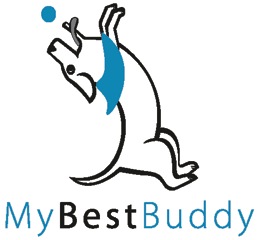By: Jane Bicks, DVM
Pet parents often ask me, “Why does my dog bow?” The answer is more complicated than you might think, as it often is with our wonderfully complex canine companions. Dog bows serve as building blocks of dog communication and also have a physiological function in the stretching referred to as pandiculation. The reason behind each bow depends on when the dog engages in the behavior. Let’s talk about this unique form of stretching first.
Pandiculation is a brain-reflex-action pattern in which many animals engage. The word originates from the Latin ‘pandere’, which means "to spread out" or "stretch oneself". Next time your dog gets up from rest, watch what he does. Most often, he’ll put his front paws out and lengthen his back as he relaxes his belly. Then he may pandiculate in reverse, by contracting the anterior muscles into a flexed posture. This “wakes up” the muscular system, particularly the rear extensor muscles responsible for running. In a very real sense, this motion activates the connection between the brain and the muscles.
Stretching and yawning upon awakening is one healthy habit that we could relearn from our companion animals. As children, we instinctively do this, but many of us lose the habit.
Remember when you used to stretch? You'd wake up, gently tighten your arms and legs, feel a yawn coming on. Then, you’d reach your arms above your head, then reach down to one leg and then the other. You would first contract your muscles, then lengthen them, followed by complete relaxation. Try it some morning … you might be surprised at how good it’ll make you feel!
Dog bowing is most commonly expressed with what we refer to as the ‘play bow’. This common posture serves as a cornerstone of dog communication. Most often, it functions as an expression of ‘let's play!” Or, it can signal an apologetic tone, such as, "Oops, I didn't mean to bite so hard. I wasn't trying to hurt you. Let's keep playing!”
Read the entire article
Visit Bandit's Buddies - Natural Heartworm Programs
What's on sale?
Holistic Pet Foods and Supplements
Like Us on Facebook
Follow on Twitter
Saturday, May 31, 2014
Play Bowing
Thursday, May 29, 2014
Doctor, What is That Smell?
If you’ve ever noticed a foul odor wafting from your pet’s hind end, there's a chance that anal sacs may be the source of the problem. As any pet parent will tell you, nothing smells as uniquely terrible as the material emitted from these glands.
In some mammals, including dogs and cats, anal sacs are small pouches which store secretions from the glands between the internal and external sphincter muscles. A dog or cat can discharge the material collected in the sac through these ducts.
One thing this liquid has in common: it almost always has a terribly offensive odor, and one that is difficult to remove from carpets, beds and clothing.
The function of these small but potent scent glands is believed to be for territorial marking and communication. Those unfortunate enough to have unexpectedly frightened a dog may have experienced the canine’s ability to ‘spray’ their glandular contents - sometimes as far as six feet! Some biologists believe, for the ancestors of modern day dogs and cats, these organs were not only used in communication, but could also have been used as defense (much as a skunk sprays for self-preservation). I can assure you that when the trapped substances are released, they’re sufficiently foul to ward off any human predators!
In most animals, anal glands function completely normally. For the most part, if it’s not a problem, you’d never have a reason to know about them. Many pet parents don’t even know that their pet has anal glands.
Read the entire article
Visit Bandit's Buddies - Natural Heartworm Programs
What's on sale?
Holistic Pet Foods and Supplements
Like Us on Facebook
Follow on Twitter
Wednesday, May 28, 2014
FDA Recall on Pet Treats
FOR IMMEDIATE RELEASE - May 27, 2014 - Pet Center, Inc of Los Angeles, CA. is voluntarily recalling its 3 oz bag of Lamb Crunchy’s dog treats (LAM-003) (UPC# 727348200038) with date code 122015 product of USA, because it has the potential to be contaminated with Salmonella.
Read the entire article
Visit Bandit's Buddies - Natural Heartworm Programs
What's on sale?
Holistic Pet Foods and Supplements
Like Us on Facebook
Follow on Twitter
Saturday, May 24, 2014
Heatstroke in Dogs
With the warm weather of summer just around the corner, many areas of the country are already heating up! Dogs, in general, are intolerant of too much heat. Because of this, it is crucial that you’re aware of the signs of heat stress or heat stroke, and how to treat them if they occur. Knowing exactly what to do when your pooch gets overheated, and immediate action can save his life.
Read the entire article
Visit Bandit's Buddies - Natural Heartworm Programs
What's on sale?
Holistic Pet Foods and Supplements
Like Us on Facebook
Follow on Twitter
Monday, May 19, 2014
Chicken Jerky Update from the FDA
Yesterday the U.S. Food and Drug Administration (FDA) reported that since its last update in 2013 that it received reports of about 1800 more cases of pets sickened by tainted chicken jerky treats from China.Thus far, the FDA has received a total of 4800 complaints of illnesses in pets.
The reports involve more than 5,600 dogs, 24 cats, three people.
REad the FDA Information Here
Visit Bandit's Buddies - Natural Heartworm Programs
What's on sale?
Holistic Pet Foods and Supplements
Like Us on Facebook
Follow on Twitter
Thursday, May 15, 2014
Bravo! Pet Food Recall
FOR IMMEDIATE RELEASE - May 14, 2014 - Manchester, CT – Bravo is recalling select lots and product(s) of Bravo Pet Food because they have the potential to be contaminated with Listeria monocytogenes.
Listeria monocytogenes is an organism which can cause serious and sometimes fatal infections in young children, frail or elderly people, and others with weakened immune systems. Although healthy individuals may suffer only short-term symptoms such as high fever, severe headache, stiffness, nausea, abdominal pain and diarrhea, Listeria infection can cause miscarriages and stillbirths among pregnant women.
However, healthy cats and dogs rarely become sick from Listeria. Animals ill with Listeria will display symptoms similar to the ones listed above for humans. People who have concerns about whether their pet has Listeria should contact their veterinarian.
The recalled product was distributed nationwide to distributors, retail stores, internet retailers and directly to consumers. The product can be identified by the batch ID code (best used by date) printed on the side of the plastic tube or on a label on the box.
Click here for full details
Visit Bandit's Buddies - Natural Heartworm Programs
What's on sale?
Holistic Pet Foods and Supplements
Like Us on Facebook
Follow on Twitter






